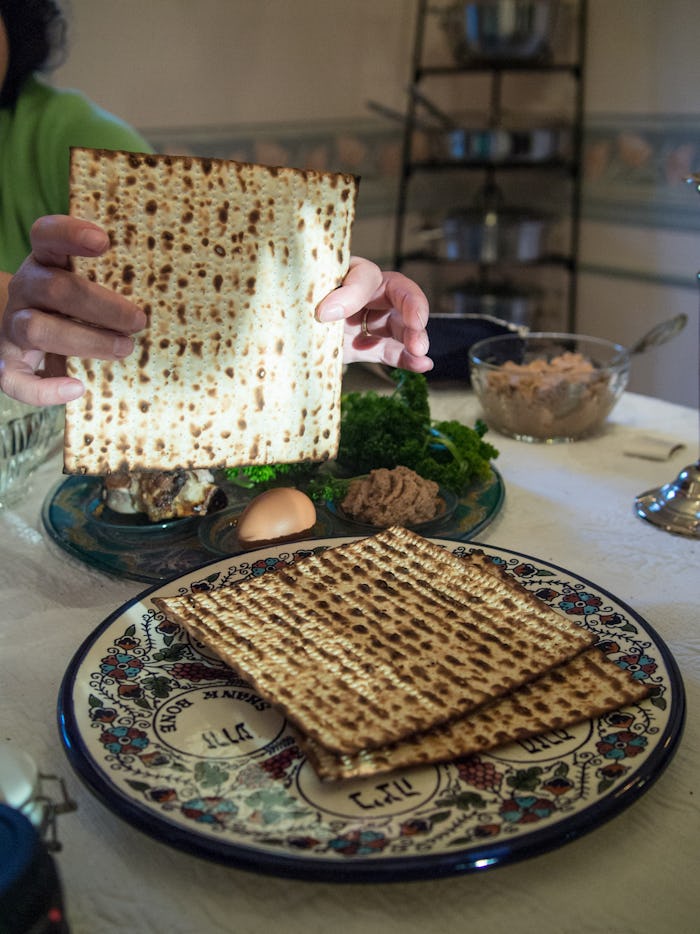If you’ve been celebrating Passover for your entire life, then it can be tricky to explain the holiday to others. Although going a full week without bread products is no longer considered odd, there are plenty of aspects to the holiday that can bear some explanations. If you want to go the extra mile and educate others about your faith, there are ways to explain Passover to your non-Jewish friends.
After all, Passover’s history is interesting: the story of the Israelites’ escape from slavery in Egypt is pretty thrilling by any standards. And most people have at least glimpsed the kosher aisle in a grocery store. You can be the good friend who helps your buddies really understand the history and significance of this holiday.
Not to mention, explaining Passover’s background may help you see the celebration in a new light and find greater appreciation for it. So to get an expert’s insight into the best way to explain Passover, I spoke with Rabbi Karen R. Perolman of Short Hills, New Jersey. She helps explain the holiday’s origins and symbolism in a fun, relatable way. And who knows? Your friends might embrace the spirit of the celebration and start sharing kosher for Passover recipes on Pinterest with you.
1Use Popular Culture
"Most people of any faith know the story of Passover from the Bible story about the Israelites in Egypt," Perolman says. You could mention movies such as The Ten Commandments or The Prince of Egypt, and explain that Passover is commemorating the events in these films.
2Explain The Unleavened Bread
You've probably fielded some questions about matzo. Follow Perolman's lead and say that you don't eat anything leavened — i.e anything with yeast — during this time because when the Israelites were leaving, they didn't have time for their bread to rise. As a result, it was flat like a cracker.
3Introduce Seder
If your friends are confused by Seder, Perolman has an easy way to explain it. "Seder is held on the first two nights of the holiday," she says. "Seder means 'order,' and it’s a dinner you do in a special order." Unlike a synagogue, it's held around a table, often with families or friends.
4Stress Passover's Popularity
Lots of people all around the world celebrate Seder. "Of all the Jewish holidays, this one is definitely among the most celebrated," Perolman says. "Meaning, people who may not celebrate many other Jewish holidays will celebrate Passover." It's an important event for many people, so stressing that fact could help friends understand the importance.
5Explain Importance Of The Number 4
Many aspects of the Seder meal pertain to the number four. If this doesn't matter to your friends, just add that you're supposed to drink four cups of wine over the course of the meal. That will probably pique their interest.
6Go Over The Questions
Newcomers to Passover can probably relate to the role of the child who is supposed to ask the four questions during the Seder meal. The first question is: "Why is this night different from all other nights?" And you can explain that the answer is basically "everything."
7Review The Symbolism
If your friend appreciates symbolic thought, then Passover has some great concepts for her. Perolman explains that during a Seder meal, the foods symbolize the story of Passover. Even the way you recline at the table demonstrates your freedom to do whatever you like.
8Discuss What Being 'Kosher For Passover' Means
Many people who do not normally keep kosher will adhere to it during Passover. For something to be 'kosher for Passover,' though, it should also be free from leavened bread. But Perolman notes that there is some variation to this practice, and that some people who do not keep Kosher will even give up bread for Passover, leading to interesting concoctions such as a BLT on matzo.
9Go Over The Length Of The Holiday
Explain the fact that there's more to Passover than Seder, and that the entire holiday goes on for seven or eight days. That's plenty of time for excellent matzo recipes.
